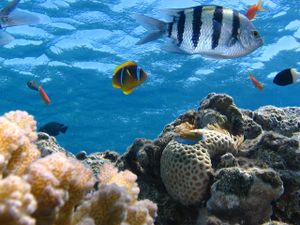Ecosystem

This page discusses what defines an ecosystem; for information on the energy within ecosystems, click here
An ecosystem is a community of different species interacting with one another and their physical environment.[2] Depending on the focus of interest or study the extent of an ecosystem may range from very small spatial scales, such as a small pond, to the entire planet.[3] These systems may be natural (forests, deserts, ponds) or man-made (crop fields, fish farms, reservoirs).
Many factors affect ecosystems and their ability to survive, with the main 3 being:[2]
- The Sun - nearly all of the energy available on Earth once originated in the depths of the sun. It provides high-quality energy for all beings on Earth.
- Cycles of matter and energy - energy flows throughout the Earth in the form of heat, light and motion. Matter also flows throughout the Earth, including water, oxygen and other molecules. There are many of these cycles, including the carbon cycle, hydrologic cycle, and the oxygen cycle.
- Gravity - the atmosphere is held in place by the Earth's gravity, which causes the downwards flow of chemicals in the matter cycles.
The delicate balance of the solar energy to the Earth allows the ecosystems on Earth to thrive. See Earth's heat balance for more information.
Components of ecosystems
The collection of all ecosystems is known as the biosphere. It can be separated into two categories, biomes (land) and aquatic life zones (water). Within these two categories are abiotic and biotic entities, the former being non-living components of an ecosystem, such as water, air and nutrients, while the latter is all biological components, from plankton to humans.[2]
Biomes
Biomes are large regions of the terrestrial portion of the biosphere. They include forests, deserts, grasslands and tundras. Biomes are characterized by a distinct climate and specific species of plants and animals.[2]
Aquatic life zones
Aquatic life zones contain many ecosystems, such as freshwater zones (lakes and streams) and ocean zones (coral reefs and deep ocean), both of which can be divided up even further. Many factors affect the types of ecosystems in aquatic zones, including, but not limited to:[4]
- Availability of sunlight
- Distance from shore
- Water depths
- Underwater flows
For Further Reading
- Energy flow in ecosystems
- Temperature of the Earth
- Earth's heat balance
- Biome
- Biosphere
- Or explore a random page
References
- ↑ Pixabay [Online], Available: https://pixabay.com/p-291322/?no_redirect
- ↑ 2.0 2.1 2.2 2.3 G. Tyler Miller, Jr. and D. Hackett, "Ecosystems," in Living in the Environment, 2nd ed. USA: Nelson , 2011, ch.4, pp.55-86
- ↑ Verbruggen, A., W. Moomaw, J. Nyboer, 2011: Annex I: Glossary, Acronyms, Chemical Symbols and Prefixes. In IPCC Special Report on Renewable Energy Sources and Climate Change Mitigation [O. Edenhofer, R. Pichs- Madruga, Y. Sokona, K. Seyboth, P. Matschoss, S. Kadner, T. Zwickel, P. Eickemeier, G. Hansen, S. Schlömer, C. von Stechow (eds)], Cambridge University Press, Cambridge, United Kingdom and New York, NY, USA.
- ↑ Harding University. (Accessed August 31, 2015). Aquatic Life Zones [Online], Available: http://www.harding.edu/doran/aquatic%20life%20zones.htm

